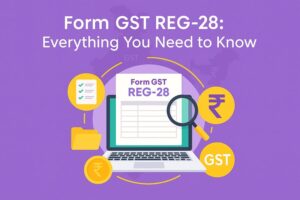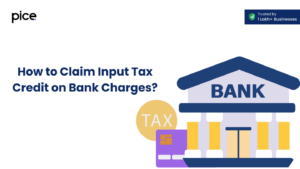Section 8 Company GST Registration
- 18 Jun 25
- 10 mins

Section 8 Company GST Registration
Key Takeaways
- GST registration is mandatory for Section 8 companies engaging in trade or crossing state lines, regardless of turnover.
- Section 8 companies can claim Input Tax Credit (ITC) and may benefit from the GST composition scheme if eligible.
- Despite being non-profit, Section 8 entities are treated as taxable persons under GST law when providing goods or services.
- GST compliance brings administrative burden but enhances credibility and protects from penalties.
- Proper documentation—like PAN, incorporation details, and activity lists—is essential for smooth GST registration.
Since the introduction of the Goods and Services Tax (GST), Section 8 companies have been severely impacted, just like similar companies. The main reason for forming a Section 8 company registration is to promote non-profit goals such as arts, charity, trade, commerce, religion, social welfare, environmental protection, sports research, etc.
A Section 8 company requires the involvement of a minimum of two directors. Additionally, there is no need for a minimum paid-up capital. The entire registration procedure of any non-profit organizations takes place either with the Registrar of Societies or as a non-profit entity under Section 8 of the Companies Act, 2013.
So, continue reading this blog to learn detailed insights about the Section 8 Company, eligibility, required documents, and more.
GST Registration Requirement for a Section 8 Company
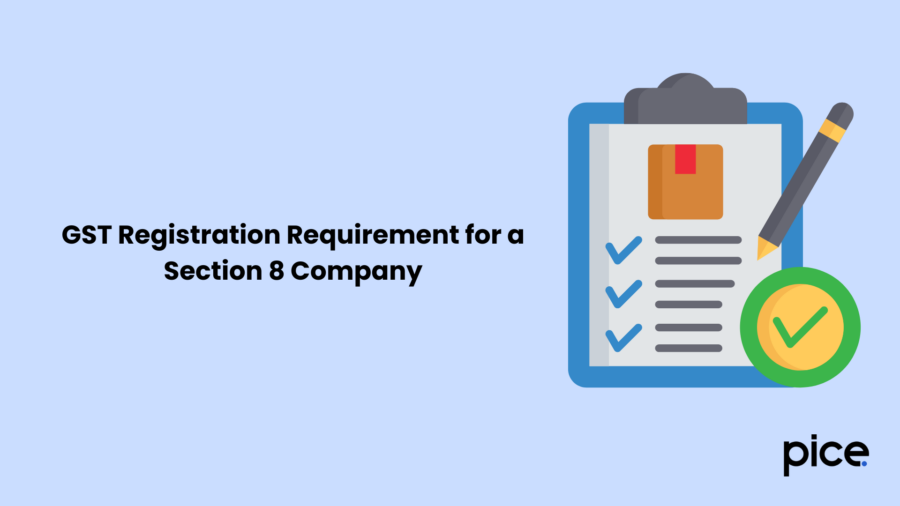
If a Section 8 company needs to abide by the GST rules, registration for GST is a must. As per the GST Act, a taxable person is defined as any authorized person capable of carrying out business at any place in India who is registered or needed to be registered under the Act.
This person can be any individual, different type of company, a firm, a Hindu undivided family, a limited liability partnership firm, an association, a government institution, a cooperative society, a trust, or an artificial legal person.
Section 8 companies are well recognised as GST-defined individuals. Not all Section 8 companies should register for GST. Section 8 companies engaged in trade and commerce must go for GST registration. Alongside this, the registration requirement applies to all Section 8 companies involved in selling goods and services.
There are many companies in the market offering services for both company registration and GST registration, specifically for Section 8 companies. This cost is usually about Rs. 20 Lakh in most states and Rs. 10 Lakh in specific categories of states such as Manipur, Arunachal Pradesh, Meghalaya, Mizoram, Sikkim, Nagaland, Tripura, Himachal Pradesh and Uttarakhand.
Without considering the turnover rate, a Section 8 company involved in selling goods and services beyond its state is eligible to register under GST. For example, a Section 8 firm selling goods on Flipkart and Amazon must proceed with registering for GST regardless of its turnover.
Advantages and Disadvantages of GST Registration for a Section 8 Company
There are numerous benefits and challenges a Section 8 company needs to face for GST registration. The benefits and challenges are as follows:
Benefits
- Section 8 companies are eligible to claim GST ITC on goods and services purchased. Although the cost of operations might be less expensive, it is highly efficient for Section 8 firms.
- With a yearly turnover rate of under Rs. 50 Lakh, Section 8 firms might benefit from the GST composition plan. In addition to monthly reports, Section 8 companies are eligible to file GST returns on a quarterly basis and pay 1% for traders and manufacturers and 5% for service providers.
- Undergoing GST registration can protect Section 8 companies from interest and penalties. Companies that fail to register for GST might experience cancellation, fines, interest, and confiscation of goods and services.
- GST registration boosts transparency and credibility, specifically for Section 8 companies. This might benefit donors and other beneficiaries.
Challenges
- GST registration for Section 8 Companies is essential for filing returns, issuing invoices, maintaining records, paying taxes, and more. However, this might pose additional administrative work and costs to Section 8 companies specifically.
- Section 8 companies are subject to GST audits and inspections, which can irritate and inconvenience them.
- Undergoing GST registration enables Section 8 companies to deal with the state government, central government, and GST Council. This thereby causes more confusion and complicates further the Section 8 companies.
Documents Required for GST Registration for a Section 8 Company
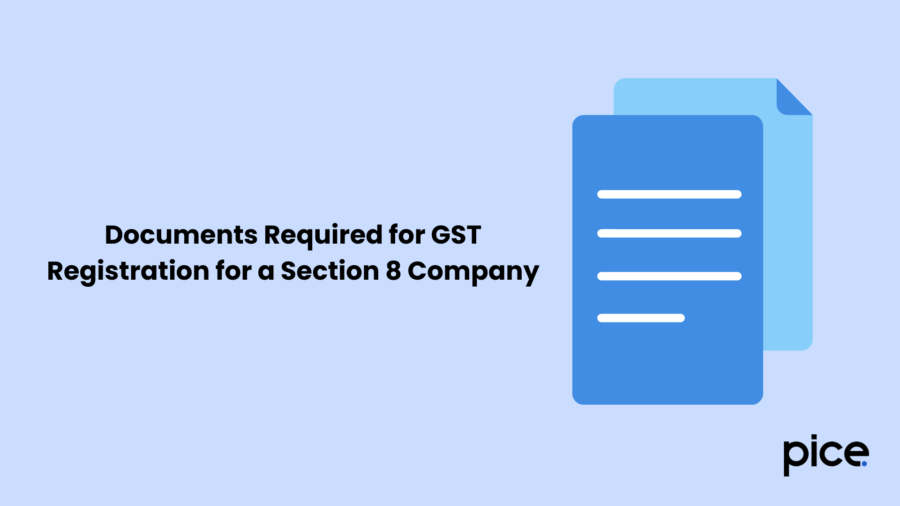
The documentation process to undergo GST registration for a Section 8 company is simple and convenient. Keeping the documents ready beforehand helps you undergo an easy documentation process. Here are the necessary documents individuals should keep ready for GST registration of a Section 8 Company:
- PAN Card of the Society/NGO/Trust
- Date of incorporation of the company
- Passport-sized photographs and PAN cards of the partners or promoter
- Business registration number (BRN) of the company
- Contact details (which comprises of website, email address, contact number, residential address)
- Identification number of the business (INN)
- List of business activities undertaken by an organisation
- Objectives and aspirations of the mission of the company
- Annual revenue as generated by the business
- Compilation of business activities conducted by the organisation
Procedures for GST Registration for a Section 8 Company
Alongside the documentation process, here is a detailed overview of the procedure of GST registration for a Section 8 Company:
- Go to the official GST portal and click on "Register Now" located under "Taxpayers (Normal/TDS/TCS)".
- Please enter all necessary details, such as state, district, PAN, legal name, contact number, and email address, to complete the application form and proceed by clicking "Proceed."
- Please cross-check the provided email and mobile number to ensure you receive the OTP, and then click on the "Continue" button.
- You will receive your email and mobile number as a temporary reference (TRN). Make sure to note it down for future reference.
- Login into the official GST portal using the provided OTP and TRN and fill in with promoter details, business details, principal place of business details, authorized signatory details, details of additional place of business, details of goods and services, bank account details, and others.
- Scan the relevant documents, upload them to the official website, and then click on the "Submit" button.
- You will receive an acknowledgment number (ARN) at your respective email address and mobile number. Keep them noted for future use.
- The GST officer thoroughly verifies your application form within three working days. Upon approval of your application, you will receive a registration certificate on your registered email and mobile number. However, upon rejection of the application, you will receive a notice stating the reasons for such rejection. The reply might be filed with the proper officer within seven working days from the date of notice in Form GST REG-05.
Eligibility Criteria for Incorporation of Section 8 Companies
Here are the desired eligibility criteria to follow for incorporation of Section 8 companies:
- Either an individual or a Hindu Undivided Family (HUF)
- At least one of the directors should be a primary resident of India
- A minimum of two individuals should serve as directors and must ensure full compliance with the obligations of company
- The incorporation of company should meet purposes of research, sports advancement, education, charitable activities, religious pursuits, environmental conservation, and social welfare
- The Section 8 company is prevented from distribution of its profits directly or indirectly to shareholders and respective members of the board of directors
- The respective board members, founders, and non-profit company associates are not eligible to obtain compensation either in cash form or non-monetary benefits
Effect of GST on Section 8 Companies
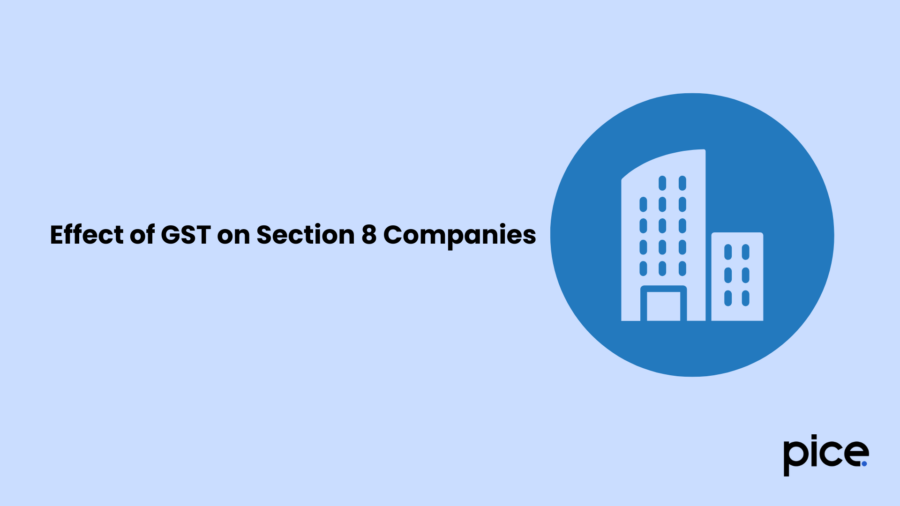
The impact of GST on Section 8 Companies is as follows:
- As a Consumer of Products and Services
When non-profit organisations are liable to receive a specific amount of money, they are excluded only from the direct taxes or taxes involved under income tax legislation. However, there is no such tax exemption under the GST laws. For example, a non-profit organisation cannot consider either 12A or 12AA certificates to demonstrate that it is exempt from payment of GST on rent if it functions outside of a commercial office. Thus, GST only applies to non-profits on the goods and services acquired.
- As a Supplier of Products and Services
Under the applicable GST laws, a trust, Section 8 corporations, and society are included while considering the definition of a taxable individual. One exception followed under this rule is that these entities are not taxable individuals under the GST if they are involved in economic activities such as trade and commerce.
On the other hand, the Maharashtra Authority of Advance Ruling (AAR) for GST has decided that the products and services provided by charitable organisations for fee classification are subject to GST. Furthermore, it is notified that if the annual returns from the sale of these goods and services exceed Rs. 20 Lakhs, every organisation must register under the GST requirements. For instance, any Section 8 business involved in offering literacy classes to women must register for GST at the first instance.
Conclusion
Overall, Section 8 organisations previously were categorised as special purpose vehicles (SPVs) and are a driving force in helping the government accomplish things it always wants to do for the welfare of society but is incapable of achieving because of various circumstances.
The majority of these firms establish a direct link between society and the well-being of people. They provide a convenient platform where individuals might come together for work and make society and the community better. Thus, these entities have most of the time contributed significantly to the betterment of society, keeping the primary objectives in mind.
💡If you want to streamline your invoices and make payments via credit or debit card or UPI, consider using the PICE App. Explore the PICE App today and take your business to new heights.
 By
By 







